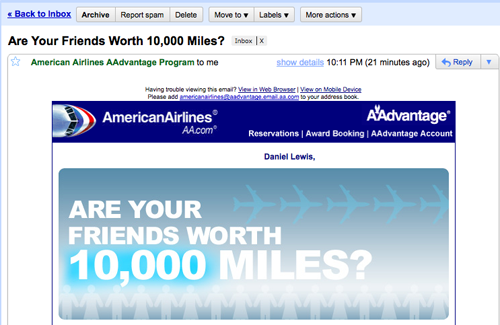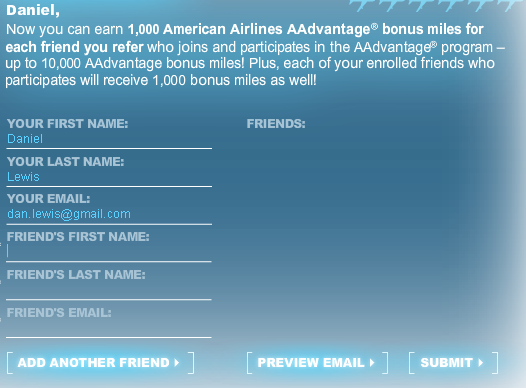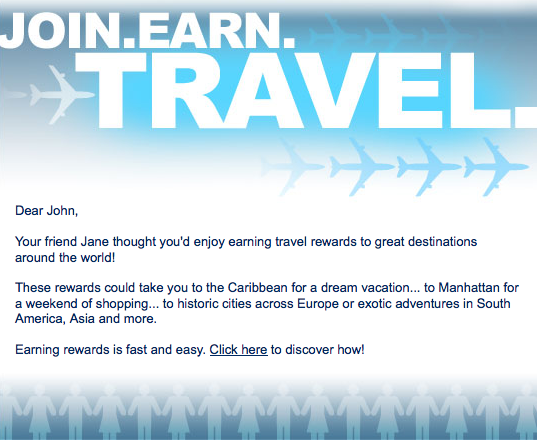Mike Arauz, a digital media strategist, had a great observation in March of 2009:
If I tell my Facebook friends about your brand, it’s not because I like your brand, but rather because I like your friends.
Spot on, and it applies to friends, and sharing, generally — not just to Facebook.
But on Friday, I received the email below from American Airlines.

American should read the Mike Arauz quote above a few hundred times, because they did basically everything wrong. Why is American Airlines explicitly asking me to spam my friends? And why do they think I’d sell my friends for a handful of air miles?
I clicked through, thinking that maybe I misunderstood. Maybe they were offering my friends 10,000 air miles, and wanted me to make the introduction, so to speak.
Clicking the banner leads me to a Flash movie (??) and then, finally, this form:

Nope. They’re offering my friends 1,000 miles to sign up — and they mention that as an aside. As one member of FlyerTalk (a forum dedicated to air miles deals) noted: “My friendships are too valuable to me for me to try and market to them for a thousand miles. The relationships are worth a lot more than that.” Bad play, American.
Then, there’s the email. You fill out the form and it generates an email, automatically, and sends it to your friend(s). I grabbed the “preview” text, below.

The email above isn’t editable, which means that I’m stuck with it*, and it invokes another quip of wisdom I picked up from Hugh MacLeod recently:

* And I would definitely have changed the email. American suggests “a dream vacation to Manhattan” as a potential use of the miles. Given that I live in Manhattan, work in Manhattan, and a lot of my friends do too, that would be a really bad vacation for me to suggest to my friend down the block or to my co-workers.
The whole project still reeks of thoughtless execution — even when you get past the punch-in-face language representative throughout the campaign. Tactically, American approached the project with the attitude that the Internet was frozen in time in 1999. There’s no way to share the offer with your friends outside of the form above. There’s no special URL you can share on Facebook, Twitter, IM, on a message board, or via an informal personal email. I need to provide not only the email addresses of my contacts (by hand — no importers apparently) but I also have to provide their first and last names. Even to the FlyerTalk crowd, many think it’s just “too much work.” (And it leads to creepy requests.)
What should American have done?
1) Redo the offer to focus on the payout to my friends.
Give my friends a meaningful incentive to join — a chance to win a free trip, or upgrades for life, or something really cool. AAdvantage miles are meaningless to them if they are not in the program already — especially if they are invested in a competitor’s program.
And American has to lead with that information. Make it obvious to me that they’re giving me a unique opportunity to do something for my friends. This encourages sharing, which is American’s strategy.
And of course, they should have tied it to the payout to me. How’s this for a great offer:
“Invite your friends to become an AAdvantage member — and your friend will be entered to win two first class tickets anywhere we fly! And if they win, so do you — we’ll give you two first class tickets, too! And just for signing up, both you and your friend get 1,000 AAdvantage miles!”
Much better (even if inarticulately written).
2) Make it dead simple to share everywhere.
In order to share, I have to fill out a form. The form requires that I know my friends’ email addresses, that I invite my friends one-by-one, and that they’re going to be OK with me sending a pretty stupid email to them which, by the way, is clearly not written by me and reads like the spam it is.
And it is way too complicated. American should be making it easy to share — that’s the whole point of the email!
Here are a few ideas:
- Allow me to forward the email to a friend.
- Add a “Post to Facebook” and “Tweet this” button. How’s this for a tweet: “Get 1,000 American Airlines air miles *and* be entered to win two first-class tickets anywhere around the world! http://aa.com/fakeurl”
- Give me a pass-around URL to share. Do it below the fold if you’re concerned about scaring off those demographic who will meet a URL with puzzle and fear.
- If you want to do the “heavy lifting” of writing the message for me, let me edit it.
And most importantly:
3) Hire someone who could have prevented the mistakes outlined above.
I am a typical over-sharer. I am active on Facebook, Twitter, and even FourSquare. I have a blog and regularly share links via two IM clients. Making something which I cannot reasonably share is a disaster, because if I could have shared it, I could have easily and gladly distributed the link to hundreds of people.
There are a lot of “me”s out there. Trying to tap into these networks is easy — if you just think it through, and if you give someone in the organization the authority to modify the plan before it gets executed on. There really is no excuse for the disaster above.